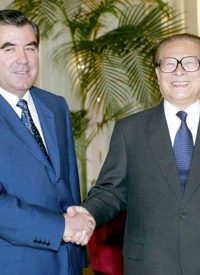
Following the release of a series of State Department cables that unveiled Russia’s support of international terrorism, WikiLeaks has yet again released a cadre of cables that further place Russia under the veil of scrutiny regarding its activities in Tajikistan.
In a secret State Department cable, dated 2005-11-14, United States Ambassador to Tajikistan Richard E. Hoagland summarized the following assessment about U.S.-Russian posturing in Tajikistan: “Although we now de-emphasize its previous Cold-War primacy in U.S. foreign policy, Russia still requires clear-eyed scrutiny for the havoc it can play with the President’s [Emomali Rahmonov] democracy agenda and larger goals for transformational diplomacy in the former Soviet republics.”
The cable followed with a dismissal of Tajikistan’s “‘open-door’ foreign policy” that “seeks to balance competing foreign pressures for its own best interests,” observing instead that “Moscow’s pressure is beginning to take a toll.” Hoagland writes, “We believe Russia is exerting consistent and strong pressure on Tajikistan to reduce the U.S. and Western role and presence.”
The means by which Russia has been “exerting its consistent and strong pressure” has been through “paying special attention to Tajikistan,” according to Hoagland, “because of its military base and other strategic interests, including the Nurek Space Tracking Center.”
The Nurek Space Tracking Center, also known as the Okno facility or space surveillance site, is currently administrated by the Russian Space Forces, responsible for the oversea of Russia’s space-based military security under the command jurisdiction of the Armed Forces of the Russian Federation. According to the Associated Press, the facility is capable of tracking natural and man-made celestial objects at distances of 24,800 miles from Earth.
The Okno facility represents only one facet of Russia’s military and intelligence control with Tajikistan’s borders.
A month later another secret State Department cable, dated 2005-12-02, highlighted details of a two-and-a-half hour encounter between Ambassador Hoagland and Tajik President Emomali Rahmonov, on December 1, 2005.
During this two-and-a-half discussion, the two men discussed Russia’s relationship with Tajikistan, which prior to its secession from the Soviet Union was known as the Tajik Soviet Socialist Republic. They also discussed ways for “Russia and the United states to develop common positions in the region, including in Afghanistan, to promote sustainable stability and prosperity.”
As the discussion about Russia continued, President Rahmonov began to outline his assessment of Russian officials, describing the Russian Ambassador to Tajikistan Ramazan Abdulatipov as “not very diplomatic, but not a bad guy.”
Rahmonov continued that his Russian problems came not principally from the ambassador, but “Actually, it’s the Russian special services who cause trouble here.” He went on to reveal “it’s not just here, it’s coming from the Kremlin, and some of it comes from the top. We can never forget that Putin himself is a ‘chekist’ [career intelligence officer] at heart.”
Russia’s current special services are the FSB and SVR, the successors to the Soviet Union’s KGB, of which Putin served as an officer of in East Germany, from 1985-1990. In 1998, Putin was appointed by Russian President Boris Yeltsin to serve as the chairman of the FSB, a post he accepted until he became the President of the Russian Federation.
According to Rahmonov, Putinist Russia has been engaged in KGB/SVR counterintelligence operations inside of Tajikistan. He then went on to leak an even more astounding revelation: “I want to tell you a secret why I insisted that the Russian Border Guards had to leave Tajikistan. You know they’re part of the KGB.”
Rahmonov claimed, “I had credible information they and (jailed General Gaffor) Mirzoyev were plotting a coup against me.” For this, Rahmonov justified why he “pushed Mirzoyev out of the Presidential Guard, disbanded the Presidential Guard, and told Putin forcefully his Border Guards had to go.”
“This,” he asserted, “had been building for a long time, and I had frequently discussed it with Putin, but he wouldn’t do anything about it.” It was “Only after I moved against Mirzoyev,” Rahmonov said, that “Putin finally understand that their game was up. To make amends, he agreed that his Border Guards would leave.”
Rahmonov went on tell Hoagland, “Why do you think I got rid of the 50 Russian generals who used to be advisers in our Ministry of Defense. They never did anything for us. They never helped us build a professional military, never gave us any military-technical assistance, because they wanted to keep us weak so their buddies could play games and make fortunes dealing drugs.”
Tired of being a pawn for the Kremlin, Rahmonov states he “got fed up” and said, “Thanks but now it’s time for you to go home. That’s one reason they eventually came up with the plot to overthrow me.”
These are either the claims of a paranoid individual or the genuine realization that he was no longer of value or use to his Russian handlers. Although he spoke of cooperating with Russia before, he justified that position based on past historical and cultural ties, as he also displayed interest in fostering better relations with the United States.
Keeping in mind the Russian maxim that President Reagan was so fond of repeating: “doveryai, no proveryai – trust, but verify,” Westerners should not fully trust themselves in Rahmonov’s camp either, for he too is no better than the Russo-Soviet handlers he served.
Rahmonov entered the political arena as a member of the Communist Party, winning his first election as a “people’s deputy” to the Supreme Council of the Tajik Soviet Socialist Republic, in 1990. Upon assuming power as President of the newly “independent” Republic of Tajikistan, he maintained his country’s military ties with the Russian Army and kept in power many of the former Communist Party officials that had maintained an iron-grip hold over the Tajik people.
This is a country, unlike post-World War II Germany, that never experienced a denazification-style approach to ridding the government of Communists.
The State Department’s inspection report for the U.S. Embassy in Dushanbe, Tajikistan, describes the socio-political environment of the country as one in which “Old habits, ingrained during the Soviet era, persist,” stating that “A seemingly stubborn resistance to open-market economic operations runs parallel to a lingering nostalgia for socialism.”
The prolonged effects of Soviet-central planning have hindered the manifestation of property rights and individual liberty as the basis of government.
In a confidential cable, dated 2006-08-01, described how Amb. Hoagland “endured a three-hour-plus one-on-one lunch” with Tajikistan’s Minister of Defense Sherali Khairulloyev, who is described by the cable as “an old-security minister.”
Upon criticizing NATO and its efforts to admit Georgia, of which Minster Khairulloyev asked, “Why does NATO want a country like Georgia?” and stated “Even the Warsaw Pact didn’t subsume losers,” he went on to suggest “that the Shanghai Cooperation Organization (SCO) has to develop to become a military bloc ‘with one-third of the world’s population’ to face down NATO.”
When Ambassador Hoagland “asked why Russia and the former Soviet republics view NATO as an enemy,” the cable describes that “Khairulloyev hoisted himself up and declared” the following: “When the Warsaw Bloc disintergrated, of course a new bloc emerged for world domination. That’s the historical dialectic. It’s now time to confront NATO.”
It should be noted that as of 2002, Tajikistan has been a member of the Russian-led Collective Security Treaty Organization (CSTO), founded in 1992, and whose present membership also includes Armenia, Belarus, Kazakhstan, Kyrgyzstan, Russia, and Uzbekistan. The amalgamation of the Shanghai Cooperation Organization into a military bloc would result in the addition of communist China and its military capacity to the CSTO defense pact.
Such an alliance would officially realign the global parity of power back to the bipolar arrangement that dominated the international system during the Cold War. This would place the Sino-Russo Eurasian alliance at odds militarily with NATO and the West; a goal apparently envisioned by Khairulloyev and predicted by high-ranking KGB defector Anatoliy Golitsyn in his book New Lies for Old.
Although these cables reveal a president that is trying to wedge a Tajik-Russo split, these cables, from 2005-2006, indicate the extent to which Moscow exerts its sphere of influence over its former Soviet republic, including a shared goal with elements of the Tajik military to counter Western and NATO hegemony.
Photo: Chinese President Jiang Zemin, right, shakes hands with Tajikistan President Emomali Rahmonov during a meeting of the summit of the Shanghai Cooperation Organization in St. Petersburg, Russia on Friday, June 7, 2002: AP Images
Related Articles:
WikiLeaks Evidence: Russia Sponsoring Islamic Terror
Hizb ut-Tahrir: KGB-FSB Connection?
Communism Still Stands in the “Stans”
U.S. Cables: Russian, Israeli Mafias Gaining Power, Infiltrating Governments
WikiLeaks Reveals U.S. & EU Climate Bullying, Bribery, Espionage



